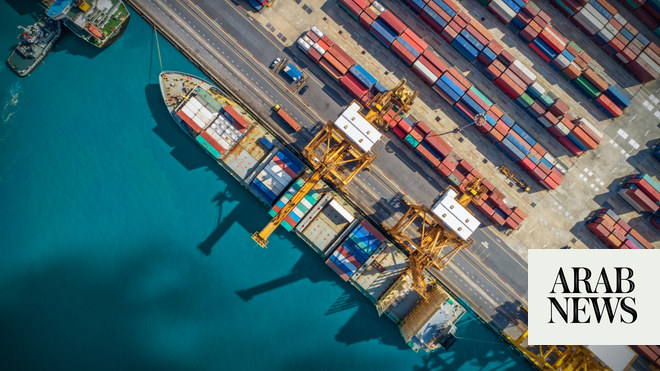
RIYADH: Countries in the Gulf Cooperation Council region should develop supply chain resilience strategies as they embark on large-scale industrialization of their economies, a report said.
According to management consulting company Oliver Wyman, current risk levels in the logistics sector need to be mitigated, especially for countries like Saudi Arabia and the UAE which depend on high-criticality products such as transformers and minerals which are crucial for industrial growth.
“In Saudi Arabia, 75 percent of transformer imports originate from only three countries. Any potential disruption in transformer supply could significantly impact several sectors such as power, manufacturing, transportation, and healthcare,” the report said.
It added that logistical issues could impact power supply, leading to decreased industrial productivity, infrastructure vulnerabilities in systems that require constant energy supply, and economic instability.
“As GCC countries scale up their economic diversification plans, including their industrial sectors, it is vital that they redouble initiatives to increase supply chain resilience to ensure the smooth functioning of all sectors and aspects of society in the event of unexpected upheavals in the supply chain,” said Frederic Ozeir, partner and head of Automotive and Manufacturing Industries, India, Middle East and Africa region at Oliver Wyman.
The vitality of supply chain resilience
Oliver Wyman noted that vulnerabilities in global supply chains came under greater scrutiny in recent years following the pandemic and numerous climate-change-induced natural disasters, in addition to cybersecurity threats, logistics challenges, and geopolitical issues.
During these years, industries across the spectrum have been forced to grapple with production delays, shortages, and an increase in prices, as well as growing demand and unexpected bottlenecks, which have highlighted the critical importance of resilient logistical chains.
“For example, of all the electrical machinery and equipment imported to both Saudi Arabia and the UAE, 60 percent and 65 percent, respectively, are imported from just three countries. Similarly, for excavation machinery and valves, Saudi Arabia and the UAE import 50 percent and 55 percent of the total from three countries,” said Oliver Wyman.
The US-based firm added that various sectors are directly dependent on the industrial supply chain, and any disruptions could have a domino effect which will amplify vulnerabilities in vital sectors that are important for health, safety, and security.
Highlighting the necessity to maintain a functional supply chain, the report noted that the healthcare industry relies on the timely delivery of medical equipment and pharmaceuticals, while the power sector hinges on a steady inflow of critical machinery and components, such as turbines, generators, and transformers.
Moreover, GCC countries are heavily reliant on desalination machinery such as membranes, pumps, and valves because desalination is the source of most of the urban water in the region.
Saudi Arabia leading the region to ensure supply chain resilience
Oliver Wyman, in its report, also lauded Saudi Arabia’s efforts to ensure a healthy logistics sector in the Kingdom, as well as the whole region.
“In 2022, KSA launched the Global Supply Chain Resilience Initiative as part of its National Investment Strategy. This aims to position the Kingdom as a location of choice for leading global industrial companies, attracting investments in supply chains in order to mitigate the impact of global disruptions,” said the report.
The study added that the UAE is also focussing on improving food supply chains through various programs such as those that support local and sustainable food production, as well as by establishing new logistics hubs and deploying cutting-edge technological solutions.
Key actions to bolster supply chain resilience in the GCC
According to the report, governments in the GCC region should develop supply chain resilience strategies that seamlessly align with their national industrialization programs.
Moreover, such strategies should be supported by a set of enablers covering governance, private sector involvement, capabilities, and technology.
Oliver Wyman also underscored the necessity of having a collaborative governance framework between different countries to strengthen the supply chain in the Middle East region.
“GCC ministries of industry and mining can work with other ministries, especially those of vital sectors to ensure supply chain resilience. As an example, a GCC Ministry of Industry that collaborates with its counterpart in the Ministry of Health would be able to better develop appropriate actions for ensuring resilience of the supply chain of medical devices,” said the report.
The report also added that GCC governments should leverage the private sector as a crucial partner in their supply chain strategies.
According to the report, countries in the region can ensure supply chain durability by incentivizing logistical resilience initiatives among the private sector, and implementing inspection and corrective actions.
Moreover, the consulting firm added that GCC countries should establish specialized teams within their ministries of industry, comprising professionals with expertise in risk assessment and management, logistics operations, data analytics, and technology to build up the logistics network.
“Various capabilities are also required across the industrial sector, such as risk assessment and management, advanced technology integration and utilization, data analytics and business continuity planning, cybersecurity, and collaboration and information sharing,” the report added.
The study highlighted that nations in the region should also encourage the adoption of technology through advanced manufacturing policies that will drive the use of 3D printing, robotics, augmented reality, and automation.
Industrial cybersecurity requirements should also be considered given the connectivity and data sharing within factories, driven by automation and the Internet of Things, the consulting firm added.
Oliver Wyman noted that GCC countries should adopt a holistic approach that combines localization with other supply chain resilience levers to safeguard the industrial growth of these nations.
“Achieving supply chain resilience in the industrial sector is not a one-size-fits-all endeavor. The levers deployed to fortify supply chains, such as localization, shoring, and partnerships, must be applied to the supply chain components of products with high criticality and risk,” Ozeir.
The study concluded that supply chain resilience is not just a choice for GCC nations, but a necessity, and one that will guarantee the sustainability of their burgeoning and all-important industrial sectors.











